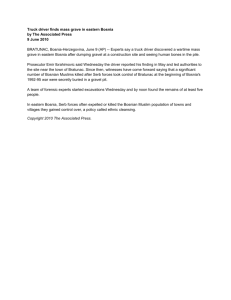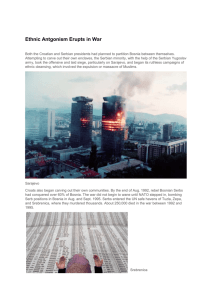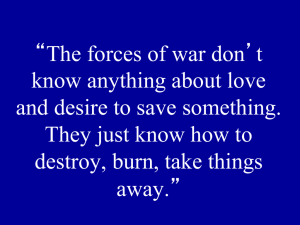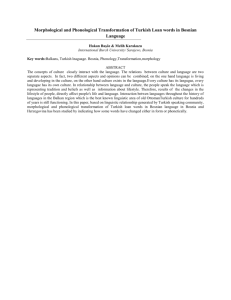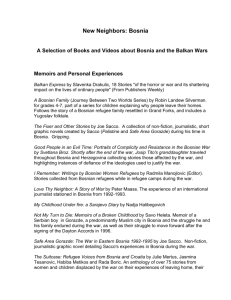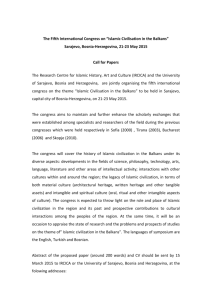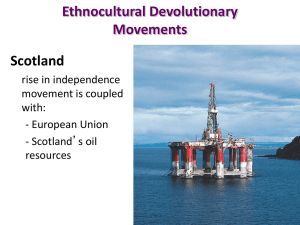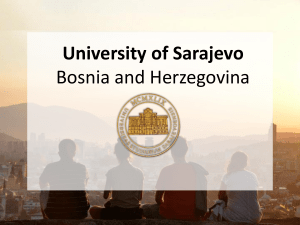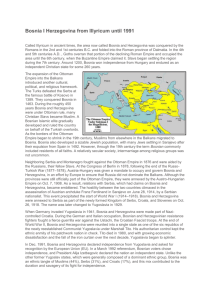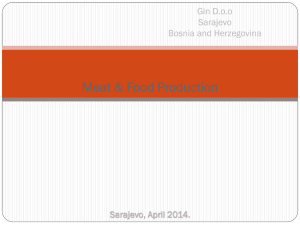sample presentation
advertisement
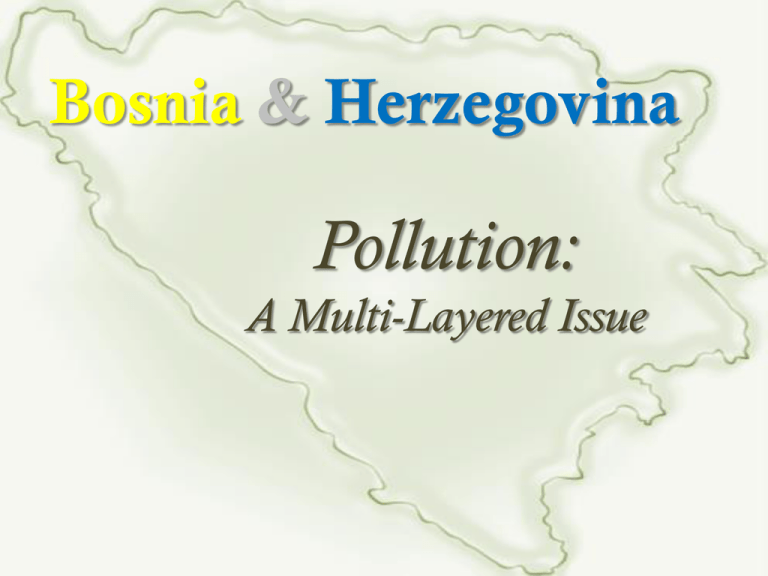
Bosnia & Herzegovina Pollution: A Multi-Layered Issue Factors Pollution is the result of several geographic patterns distinct to Bosnia And the most impacted city is the capital, Sarajevo • Physical geography- site, topography and climate • Industrial economy- former military industrial capital of Yugoslavia • Effects of Bosnian War in 1990the fragmentation of both physical and political infrastructure http://www.worldatlas.com/webimage/countrys/europe/ciamaps/ba.htm Industry In Bosnia Former Military Capital of Yugoslavia • Economic Reliance on Industry – 25% of GDP – 32.6% of Labor Force – Bosnian exports consist of 30% of their GPD. (U.S. 10%) • Top Industries – Steel, Coal and Iron http://www.reisenett.no/map_collection/bosnia/Bosnia_economy.jpg Air Pollution • Industrial causes, decreasing with current low output – Sulfur dioxide & carbon dioxide emissions • Lack of government influence on environmental regulation & preservation • Transportation – High density and population growth result in heavy traffic – Relatively old cars combined with unregulated gasoline • Reliance on low-quality coal energy – Limited fuel supply – Use of ‘primitive’ heating methods like firewood and heating oil – 2011-2012:*Extremely cold winter plus shortage in Russian fuel supply resulted in excessive burning of oil and wood severely diminishing air quality – What will climate change bring? • Health hazards – Chronic bronchitis – Pulmonary disease – Lung cancer Sarajevo : January 19th 2011, Tuzla Coal Mines Bosnian War: 1990s • • • • • Bosnia declares independence in 1992 – Ethnic make up of Bosnia in 92’: 43% Muslim, 31% Orthodox, 17% Catholic Washington Agreement signed between Bosnians and Croatians in 1994 Srebenica massacre July 1995 – 8,000 people killed in one day. Dayton Agreement signed in December 1995 Attack on Sarajevo was longest siege on a capital city in modern history – April 1992-Feburary 1996 Siege on Sarajevo Legacy of the Siege on Sarajevo ‘Urbicide’ –targeted destruction of hospitals as well as government, media and military centers, etc. Fragmentation of physical infrastructure Destruction of transportation systems -Roads, rail lines, bridges Destruction of industrial capital -Electric & telephone lines damaged -Economic halt -Little to no output Lack of adequate housing & sanitation Fragmentation of cultural infrastructure Fractured government -Lack of central authority and inadequate policy City-wide psychological damage -High suicide & abortion rates Demographic crisis -Low birth rates, high death rates -High number of out migration -Refugees & IDPs MILITARY WASTE= water, air, & soil pollution http://www.flickr.com/photos/northfoto/4208586324/sizes/l/in/photostream/ Military Waste: Deadly Pollution Includes both unexploded weapons (mine fields) -Nearly 3.68% of country is still minecontaminated -1,520 deaths from unexploded mines have occurred since the war And exploded waste (shrapnel, shells, etc) -Problematic shrapnel embedded in trees *Deforestation & economic concerns Rebuilding Sarajevo Sarajevo 2002 Sarajevo 2012 2003 2007 2012 Bosnia & Herzegovina’s Future Relating to Pollution • With Croatia’s recent acceptance into the EU, and Bosnia’s economy heavily focused on exports, Croatia has required Bosnia’s health codes improve or else trade between the countries could end. • Milk one of the main Bosnian products that Croatia is concerned about, and although they have a year to improve the conditions it may not be enough time. • Croatia is extremely interested in joining the EU but if they continue to accept poor quality products their acceptance could be revoked, or they could simply discontinue their trade with Bosnia. • While the health of Bosnian citizens has been negatively affected by air pollution, military pollution and more, the fact that a major part of their economy could be lost is just another reason to improve the quality of their products. Final Thoughts • Years after the war Bosnia is still in the process of rebuilding its infrastructure, culture and economy • Environmental degradation is at the forefront of the country’s concerns, as it is a multifaceted issue – – – – – Impending climate change Geographic site and situation Lasting effects of the war Industrial and economic health Governmental authority and strength Sources • • • • • • • • • • • • • http://en.wikipedia.org/wiki/File:Serbia_in_the_Yu goslav_Wars http://nimg.sulekha.com/others/original700/bosnia-mines-2010-1-11-16-40-49.jpg http://www.undp.ba/index.aspx?PID=21&RID=70 http://europeandcis.undp.org/home/show/3FA4752C-F203-1EE9BA3B2F6581236449 http://earthobservatory.nasa.gov/IOTD/view.php?id=38337 http://www.eea.europa.eu/data-and-maps/figures/airbase-exchange-of-information3/so2-2008concentration/Airbase_2010_concentration_SO2.eps.75dpi.gif/at_download/image http://balkansnet.org/sa-mines.gif http://onlinelibrary.wiley.com.proxy.uwec.edu/store/10.1111/j.14678322.2012.00851.x/asset/j.14678322.2012.00851.x.pdf ?v=1&t=h1x1cd9s&s=8328a5b79b56e04e4d715ef8f535bb434408 2866 http://www.balkaninsight.com/en/article/unprepared-bosnia-still-wasting-time-beforecroatian-eu-bid http://www.eea.europa.eu/soer/countries/ba/air-pollution-why-care-bosnia http://inapcache.boston.com/universal/site_graphics/blogs/bigpicture/coal/bp15.jpg http://www.ohiocitizen.org/campaigns/isg/zenica2.jpg http://www.flagsinformation.com/bosnia_and_herzegovina-country-flag.html
